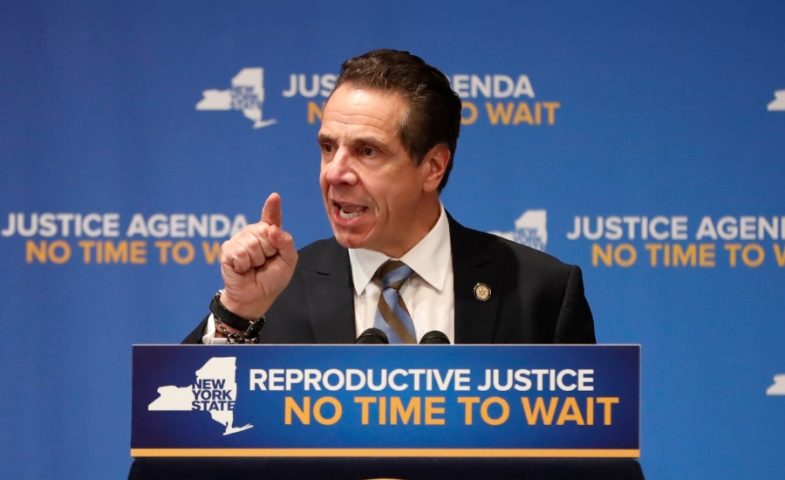New York’s New Abortion Law is Terrible. Just like Roe v. Wade

Cardinal Dolan: Excommunicating Andrew Cuomo “Not an Appropriate Response” for Legalizing Abortions Up to Birth
January 26, 2019
The New Sisterhood: Traditional Orders Are Booming
January 26, 2019
In this Monday, Jan. 7, 2019, file photo, Gov. Andrew Cuomo speaks during an appearance with former Secretary of State Hillary Clinton where both Democrats called for codifying abortion rights into New York State law during a joint appearance at Barnard College in New York.
By Austin Ruse and Cathy Ruse, JD, The Stream, January 25, 2019
 Pro-lifers are making a mistake by touting the new abortion law in New York state as anything drastically new.
Pro-lifers are making a mistake by touting the new abortion law in New York state as anything drastically new.
You have seen the headlines, the gifs and memes, the Facebook and Twitter posts outraged that abortions are now legal in New York state up to the moment of birth. Make no mistake the new law is an outrage. But make no mistake, this is not even remotely new.
Roe v. Wade itself legalized abortion through all nine months of pregnancy. State laws that appear to ban late-term abortions are not worth the paper they’re printed on.
Most Americans have no idea how radical our national abortion law is. Why would they? A day after the Roe ruling, the headline in the New York Times read: “High Court Rules Abortions Legal the First 3 Months.” The original Fake News.
Understanding Roe
In 1973, the Supreme Court took the issue of abortion policy out of the hands of the people and our elected state representatives and wrote a new national abortion policy permitting abortion at any point in pregnancy, for virtually any reason.
That’s why pro-lifers speak of “abortion on demand.” And why abortion apologists like Amy Richards trumpet the fact that they didn’t have to have a good reason to abort their babies — they could, just because they wanted to.
Many people have heard of Roe v. Wade, but most people have never heard of Doe v. Bolton, decided the same day. If you don’t know Doe, you don’t know Roe.
Help us champion truth, freedom, limited government and human dignity. Support The Stream »
The Roe decision nullified every state law on the subject, making abortion legal in the first, second, and even third trimester of pregnancy, provided the abortion is done to further the mother’s health. Then, quietly, the Doe decision defined “health” so broadly as to render any state limitation meaningless. The Court defined “health” as: “all factors — physical, emotional, psychological, familial, and the woman’s age — relevant to the well-being of the patient.”
Later in Planned Parenthood v. Casey, the Court abandoned the trimester framework but reaffirmed the legality of aborting a baby after she is viable for the “health of the mother.”
Because of Roe and Doe, an abortionist in America is free to abort a baby at any point in pregnancy so long as he asserts that there will be an “emotional” benefit to the mother. That was the controlling law in New York before this week.
What’s New About the New York Law?
Is it true that New York just passed a radical new abortion law? Yes. Is it really new? Certainly, there are new things in it. Medical doctors need not be the only ones allowed to perform abortions, for instance. That’s new and terrible and will cause the death of women. The new law also places abortion in the New York State constitution. And there are other aspects that are “new.”
But it is not remotely “new” that babies can be aborted through all nine months of pregnancy in New York State. That is not new at all. That has been the law in New York State since Roe and Doe mandated it 46 years ago.
Most people think an unlimited right to abortion is wrong. That means most people disagree with Roe. They just don’t know it.




